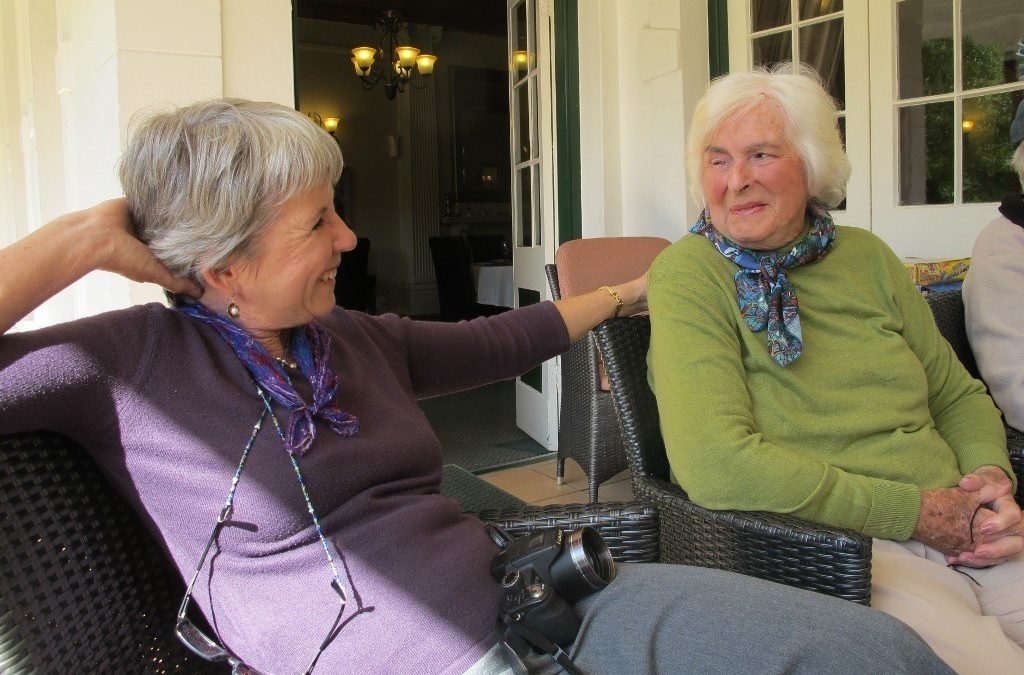Alice Ashwell is a life coach, educator and facilitator, who offers individual and group coaching, Nature connection experiences, and workshop facilitation. Her love of Nature and her personal and career journeys led Alice to create the coaching practice, Heart of Nature.
Her mother, Elizabeth, passed away in January 2016 after living with dementia for about 15 years. “I know how devastating it can be when someone who has known you all your life forgets who you are; when the person who once did everything for you becomes entirely dependent on others” says Alice. In honour of Elizabeth’s memory, she offers life coaching support to those whose loved ones are living with dementia. This month we chatted to Alice about her journey.
How did it make you feel hearing that your mum was diagnosed with dementia?
At the time when my mum was first diagnosed with Alzheimer’s disease, I knew very little about the condition. What I’d heard about it sounded so scary that my first response was to think that if I ignored the situation it would go away! But, of course, it didn’t. It was just the beginning of a life-changing 15-year journey.
What advice can you offer someone who has had a loved one diagnosed?
It’s a huge shock when a loved one is diagnosed with dementia, so be kind to yourself. When you feel ready, there are wonderful sources of information and support available to help you understand the changes caused by dementia, cope with the emotional aspects of the journey, and keep your loved one connected to life, love and meaning.
Here are three pieces of advice that I’ve found most helpful:
- Don’t ask the person questions they can’t answer – Alzheimer’s disease destroys a person’s short-term memory first, so don’t ask them what they had for breakfast or what they did last week … it will just remind them that they have forgotten, and that will confuse and upset them.
- Don’t contradict the person – step into their world and say ‘yes’ to their reality. If the memories that remain are older memories, the person may think that they are younger than they are. So, they may not recognise you as a daughter if they think they are 35 and you look like you’re 50!
- When your loved one’s ‘hard drive’ has crashed, YOU are their ‘external hard drive’. So, if your loved one forgets your name or a special event, let it go. YOU remember who they are and why they are special. Remind them.
What impacted your decision to move your mum into Livewell Villages?
Mum was living in a retirement village when she was diagnosed with dementia. As her family, we felt it was important that she remained in her apartment for as long as possible as she was physically strong and not ready for ‘frail care’. We put a lot of things in place to help her cope in her flat, but eventually management insisted that she move to the frail care wing. In contrast to her quiet, comfortable flat with access to the garden, frail care was noisy and hospital-like with no access to the outdoors and only daytime TV for entertainment. The rapid deterioration in mum’s mood made us start looking for an alternative.
Livewell Villages in Somerset West had just opened, and we couldn’t believe the difference. The gracious old buildings and beautiful grounds felt like home, and the inspired and loving staff knew, honoured and responded to each resident as an individual, and enabled them to enjoy life to the full. Mum and her grand piano moved into the Village the following month. Thanks to the quality of care experienced at Livewell, the last four years of Mum’s life were some of the happiest of her life.
You currently work in the dementia space. How has your journey with your mum impacted your job and the services you offer?
Mum’s dementia journey changed my life in many ways. She taught me so much that when she passed away, I started ‘Dementia Connections’ to provide education and coaching for those who love and care for people living with dementia. While dementia is extremely challenging, it can also become an opportunity to deepen relationships. One of the greatest blessings of mum’s dementia was that she taught me how to slow down and be present. As her dementia progressed, mum lost more and more memories and was no longer able to project into the future. But we could enjoy experiences in the present moment, sharing our appreciation of music, nature, touch and closeness.
In the early stages of mum’s dementia, I didn’t cope well emotionally. I was irritable and impatient with her, which made me feel really guilty! Eventually I learnt some simple calming techniques, which made such a positive difference that I now teach those same techniques to others. My ‘calm practice’ helped me to manage my stress, which in turn helped mum to feel calm and safe. It also enabled me to become still enough to find a way to communicate with mum after she forgot how to speak. In fact, these quiet times together were the most intimate times of sharing I ever experienced with her.
Tell us about what you do and how people can contact you?
I offer a range of services, including presentations, individual and family coaching, workshops and courses for family members, friends and professional caregivers. I am based in Wynberg, Cape Town and also offer courses and coaching online. I also have a Facebook page where I share inspiring stories and helpful advice relating to dementia.
You can reach Alice on 082 720 7444 | [email protected].
Facebook: Dementia Connections SA | Website https://heartofnature.co.za
Alice recently submitted a collection of poems about her mother for our Remembering You campaign. If you would like to share something about your loved who has lived or living with dementia, please visit https://rememberingyou.co.za/.
